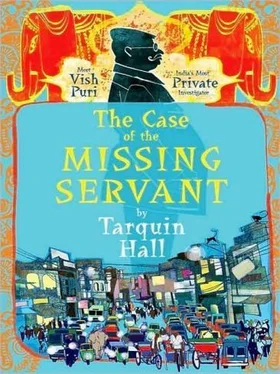Tarquin Hall - The Case of the Missing Servant
Здесь есть возможность читать онлайн «Tarquin Hall - The Case of the Missing Servant» весь текст электронной книги совершенно бесплатно (целиком полную версию без сокращений). В некоторых случаях можно слушать аудио, скачать через торрент в формате fb2 и присутствует краткое содержание. Год выпуска: 2009, ISBN: 2009, Издательство: Simon & Schuster, Жанр: Детектив, на английском языке. Описание произведения, (предисловие) а так же отзывы посетителей доступны на портале библиотеки ЛибКат.
- Название:The Case of the Missing Servant
- Автор:
- Издательство:Simon & Schuster
- Жанр:
- Год:2009
- ISBN:978-1-4165-8402-5
- Рейтинг книги:3 / 5. Голосов: 1
-
Избранное:Добавить в избранное
- Отзывы:
-
Ваша оценка:
- 60
- 1
- 2
- 3
- 4
- 5
The Case of the Missing Servant: краткое содержание, описание и аннотация
Предлагаем к чтению аннотацию, описание, краткое содержание или предисловие (зависит от того, что написал сам автор книги «The Case of the Missing Servant»). Если вы не нашли необходимую информацию о книге — напишите в комментариях, мы постараемся отыскать её.
The Case of the Missing Servant — читать онлайн бесплатно полную книгу (весь текст) целиком
Ниже представлен текст книги, разбитый по страницам. Система сохранения места последней прочитанной страницы, позволяет с удобством читать онлайн бесплатно книгу «The Case of the Missing Servant», без необходимости каждый раз заново искать на чём Вы остановились. Поставьте закладку, и сможете в любой момент перейти на страницу, на которой закончили чтение.
Интервал:
Закладка:
Together they made their way back across the lawn and down the side of the house to the driveway, where Handbrake was waiting in the car.
"Madam, one more question is there, actually," said Puri before he headed off to the court. "What all were your whereabouts on August twenty-first night?"
"I was playing bridge with friends, Mr. Puri."
"I see. And you returned at what time exactly?"
"Quite late, Mr. Puri. Some time after midnight, if I'm remembering correctly. Before you ask, Mary's absence came to my attention the next morning only."
"Must be there were other people around the house-servants and all?"
"Certainly, Mr. Puri. But who knows what goes on when I'm not around. I shudder to think, really I do."
"Can you list all of those who might have been present at the time?"
"But of course, Mr. Puri. Let me write the names down for you."
She wrote:
Jaya, maidservant
Kamat, cook assistant
Munnalal, driver
Dalchan, mali
Seven
Outside Jaipur's District and Sessions Court, rows of male typists sat at small wooden desks bashing away at manual typewriters. The tapping of tiny hammers on paper punctuated by the pings of carriage bells was constant-the very sound of the great, self-perpetuating industry of Indian red tape.
Hovering behind each typist stood his clients: complainants, defendants, petitioners and advocates, all watching to ensure their affidavits, summons, wills, marriage applications, deeds, indentures and countless other types of form were completed accurately. A rate of ten rupees per page was charged for this service, an unavoidable fee given the court's stipulation that all official documents should be typed (and one exploited to the full by the typing mafia, who ensured that there was not a word processor in sight).
In front of the courthouse sat rows of advocates whose "offices" were out in the open. Each had a desk with his name prominently displayed on a plaque, a few chairs and a metal filing cabinet packed with bulging files tied with string.
Schools of hangers-on circled the lawyers, like symbiotic fish feeding off the parasites on sharks. Chai-wallahs moved between the rows of desks with trays of small glasses of sweet milky tea, calling "Chaieee, Chaieee!" Grubby little urchins carrying wooden boxes with brushes, rags and tins of polish offered to shine shoes for four rupees.
Hawkers sold roasted peanuts in newspaper cones.
Various businesses had also set up under a banyan tree. There was a barber-a mirror attached to the gnarled trunk and a high chair-catering to those requiring a haircut or a shave before making their appearance in court. A table with a phone and a meter hooked up to a car battery also served as a "telecon center."
Like any place in India where people gathered, the courts attracted beggars and a collection of wildlife as well. A man with no legs rolled around on a makeshift skateboard, holding his hand up in hopes of a handout. Rats and crows competed for discarded peanut shells. Pye-dogs lazed in the winter sun.
Puri passed through this throng with disdain written large across his face. His aversion to India's courts had developed long before he became a private detective. In the mid-1970s, his father had been falsely accused of bribery and become embroiled in a court battle to clear his name, which had dragged on for nearly fifteen years and had sullied his reputation forever. As a teenager, the young Puri had spent many a morning or afternoon waiting patiently outside the Rohini courts complex, where he had seen for himself how corrupt and inefficient the system was. Often he would meet his cousin Amit there, trying to settle a property dispute that had started between his grandfather and great-uncle some twenty years earlier and embroiled the next two generations in pointless quarrelling and exorbitant legal fees.
According to one newspaper article Puri had read recently, it would take half a century to clear the backlog of cases pending in India. And there were hundreds more being added every day.
The detective passed some of the system's victims in the corridors of the main building as he searched for the courtroom where Ajay Kasliwal was arguing a case. Many of them were poor and illiterate, unable to afford proper representation or the bribe money necessary to grease the palms of the countless gatekeepers to justice. They crouched on their haunches, resigned and helpless in the face of endless adjournments, incomprehensible legal jargon and unchallenged violations of their fundamental rights.
A jostling crowd of advocates, defendants and their families blocked Puri's entrance to Court 19. He found a space on a bench outside and waited for Kasliwal to emerge. Next to him sat an old man with the dry, cracked heels of a farmer who had spent long years plowing parched fields.
Puri asked him what he was doing there and soon the farmer was telling him about his case. It had begun with a dispute over a water buffalo.
"My neighbor stole the animal at night," he said. "When I complained to the police, they beat me. The court said there was no evidence and I was ordered to pay my neighbor's legal fees. Now I am in dispute with his lawyers because I cannot pay and my own lawyer is also charging to represent me. When I come here to appeal, either the lawyers do not appear or there is no time given to me in the court. Meanwhile the bills grow larger and still I cannot pay. In the end I will be bankrupt, they will take my land and I will have no choice but to take my own life."
Puri asked him how much he owed. The amount was two thousand rupees.
"And how long have you been coming here?"
"Three years."
It saddened him to think that in today's India, sixty years after the nation had won its independence, a man's future and that of his family hung in the balance over an amount equivalent to a restaurant bill. He felt inclined to take out his wallet and give the farmer the amount he required. But he knew cash handouts were not the answer; the money would just get swallowed up. What was needed was reform. Perhaps by defending Ajay Kasliwal, he could help achieve it.
"Case adjourned," said Kasliwal, squeezing through the swell of people clambering to get inside Court 19. "That's the third time this week."
"On what grounds?" asked Puri.
"The key witness was supposed to be deposed before the judge, but it seems His Lordship has been bought by the opposition."
The two men left the building and drove over to the Rajasthan High Court, where Kasliwal had his office.
"The problem with the system is such that it is almost impossible to remain honest," said the lawyer. "So much temptation is there, I tell you. Everyone is involved. All these bastards are looking after one another's interests. If you get one good apple, then they're worried it will spoil the batch. They don't want honest fellows like me around who aren't ready to do match fixing.
"It is a great conspiracy of interests," he continued. "I'm fighting the entire system, Puri-ji. My enemies are surrounding me on all fronts. But we must root out this evil. How can India expect to reach superpower status with all this corruption around? It is like a great hand around our throats. I, for one, am prepared to fight it with every bone in my body."
Kasliwal's office was plainly furnished with just a desk, a few chairs and picture of Gandhi on the wall. In the bottom drawer of his desk, he kept a bottle of Royal Challenge.
"It's good for bad purposes." He chuckled, pouring Puri a small glassful, then adding some soda.
The two men clinked glasses and sat down on either side of Kasliwal's desk, facing each other.
"Puri-ji, you are a good man," said the lawyer. "That is as clear as day. Come what may, we will be friends! That is for sure."
Читать дальшеИнтервал:
Закладка:
Похожие книги на «The Case of the Missing Servant»
Представляем Вашему вниманию похожие книги на «The Case of the Missing Servant» списком для выбора. Мы отобрали схожую по названию и смыслу литературу в надежде предоставить читателям больше вариантов отыскать новые, интересные, ещё непрочитанные произведения.
Обсуждение, отзывы о книге «The Case of the Missing Servant» и просто собственные мнения читателей. Оставьте ваши комментарии, напишите, что Вы думаете о произведении, его смысле или главных героях. Укажите что конкретно понравилось, а что нет, и почему Вы так считаете.












